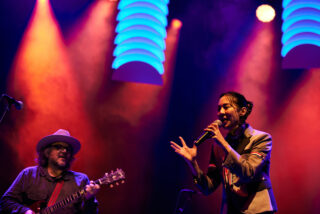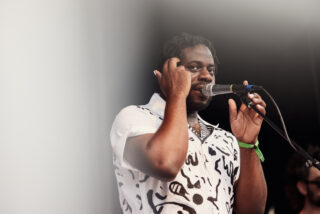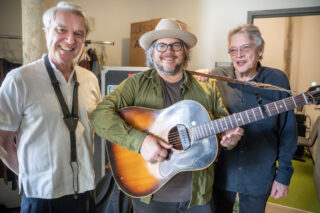Wilco’s Solid Sound: a celebration of “every band’s band”
Tweedy and co bring Japanese Breakfast, Iceage, NNAMDÏ and more to the Massachusetts Museum of Contemporary Art

Tweedy and co bring Japanese Breakfast, Iceage, NNAMDÏ and more to the Massachusetts Museum of Contemporary Art
Just before she launched into ‘Posing For Cars’, Michelle Zauner admits: “When I wrote this one, I was trying to rip off ‘At Least That’s What You Said’.” It’s hard to see a more appropriate precursor than Japanese Breakfast for Wilco’s headlining Saturday night at their own festival. Tailored in a striking patchwork suit, beamingly wearing her influences on her sleeve, and running through a gamut of primarily Jubilee hits, Zauner thanks the receptive crowd for being able to appreciate “midtempo rockers”, proudly stating that “Wilco is every band’s band.”
True to Zauner’s aphorism, the influence of the band echoes deeply through the younger generation of North Adams’ Solid Sound Festival. Independent singer-songwriters like Sam Evian and Daughter of Swords and rising indie folk groups like Hand Habits and Cut Worms ring sonorously through the festival’s beautiful venue, The Massachusetts Museum of Contemporary Art. The museum’s industrial campus is retrofitted from a printworks factory, and hosts both indoor and outdoor performances; sunlight dapples metallically through upside-down trees and a circumferential moat, and attendees can just as easily veer from bustling food trucks to the cool, sprawling exhibits of the museum.
When Wilco launched Solid Sound in 2010, they wanted to helm a multimedia festival with an aim of creativity, interactivity, and forward-thinking artists – while still being keenly aware of its age demographic. Volunteers lead early-morning hikes through the woods, and children are always in consideration, wearing protective earmuffs and coloring on tarps as they’re catered to with live performances of the award-winning podcast Story Pirates and Johnny Irion’s interactive show Catch a Song. A quieter alternative to the music programming, comedy resounds in the museum’s blackbox theatre, with names like Desus & Mero’s Josh Gondelman, Big Mouth’s Ayo Edebiri, and Bird Girl’s Negin Sarsad performing biting stand-up. Segwaying into a joke about top surgery, Take My Wife’s River Butcher asks: “Who was raised in the VHS and VCR era?” After seeing an entire sea of hands go up, he quips: “That’s right; everyone at Solid Sound.”
Nonetheless, during Solid Sound’s very first event – a Substack-hosted Q&A session with Neko Case and Nick Offerman – Jeff Tweedy asks, “Can we please stop pretending only white middle-aged dads listen to Wilco?” In that line, there’s certainly a myriad of hallowed indie names that you might expect from a Wilco-helmed music festival: the aforementioned Case plays a set under a secret name, while Cibo Matto’s Yuka C. Honda and Bonnie ‘Prince’ Billy and Sun Ra Arkestra play robust, respected sets.

But alongside them, Solid Sound still pushes decidedly out-of-genre but forward-thinking. Hampered by an injury and the bout of a sudden thunderstorm (despite a sea of T-shirts that proclaim IT NEVER RAINS AT SOLID SOUND), Iceage perform a shortened but no less wild setlist; NNAMDÏ, outfitted in a monochrome, monogrammed jumpsuit, performs cuts from 2020 album Brat with infectious joy; Los Angeles noise-rockers Kamikaze Palm Tree toss fierce back-and-forth vocals beneath a deep midnight sky.
Rising stars like Angel Bat Dawid and Claire Rousay particularly drew attention. Clad in ornate hair beads and a royally purple outfit, Dawid announced her presence offstage in a melodious bellow, performing raucously experimental jazz pieces from both her own recent oeuvre and Julian Terrell Otis’s All The Pretty Flowers. Ambient artist Claire Rousay performed in an intimate pop-up against the post-apocalyptic backdrop of artist Amy Hauft’s Meteorite exhibit, spinning intricate webs of sound collage against a sea of plastic grass and stalagmite-like chandeliers. Later that night, in an elegantly improvisational piece, she holds out a phone and asks audience members: “Tell me about a time you felt lonely,” before skilfully folding back their answers into reverberating, unintelligible waves of spoken word.
Appropriately, Wilco themselves proliferate beyond their performances, appearing in pop-up performances and other ventures. Nestled in an observation deck that overlooks the lush Taconic mountains, Jeff Tweedy careens through experimental drone performances with Sylvan Esso’s Nick Sanborn, while his son, Samuel Tweedy, performs a live recording of his expansive, thoughtful Self-Reflection series. Pat Sansone, surrounded by polaroids of Americana in his exhibit “Noticings”, quietly explains his approach to visual artistry. When an audience member asks him about his approach to live performance, he smiles, paraphrasing Pete Townshend as he answers: “It feels like you’re trying to flail yourself closer to God.” Ambitiously, Wilco guitarist Nels Cline plays in his own avant-garde jazz quartet, shreds through tracks from Mike Watt + The Missingmen, and makes a vivid guest appearance on Japanese Breakfast’s own ‘Posing for Cars’.

Wilco perform as a whole to a raucous reception every day of the festival. Saturday’s headlining set sprawls across two-and-a-half hours, and honeyvoiced guest vocals by Michelle Zauner on ‘Jesus, Etc’, while the more laidback Sunday performance features surprise guests David Byrne and Terry Allen as assists in a cover of Woody Guthrie’s ‘California Stars’. The night of Cruel Country’s release, before Wilco play through the record with meditative skill, Tweedy speaks to his audience for the only time in the set: “This is probably going to be the only time we play this record in full.” Through the darkness, he pauses to look out at the expectant field of thousands, and concludes: “Thank you for helping us celebrate.”
Photography by Charles Harris and Austin Nelson